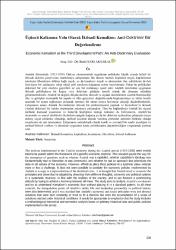Üçüncü kalkınma yolu olarak iktisadi Kemalizm: anti-doktriner bir değerlendirme
Citation
Sarı Aksakal, B. (2023). Üçüncü Kalkınma Yolu Olarak İktisadi Kemalizm: Anti-Doktriner Bir Değerlendirme. Afyon Kocatepe Üniversitesi Sosyal Bilimler Dergisi, 25(100. Yılında Cumhuriyet Özel Sayısı), 236-257. https://doi.org/10.32709/akusosbil.1317080Abstract
Atatürk döneminde (1923-1938) Türkiye ekonomisinde uygulanan politikalar büyük oranda belirli bir
iktisadi doktrin çerçevesine oturtulmaya çalışılmıştır. Bu durum Atatürk kapitalist miydi, kapitalizmin
ideolojisi liberalizme kökten bağlı mıydı, ya da komünist miydi ve ekonomide tüm sektörlerde devleti
önceleyen bir yaklaşıma sahip miydi gibi soruların doğuşuna zemin hazırlamıştır. Fakat bu politikaları
doktrinel bir yere oturtma gayretleri az çok bir zorlamaya işaret eder. Atatürk tarafından uygulanan
iktisadi politikaların bir kopya veya doktriner görüşün temsili olarak ele alınması mümkün
görünmemektedir. Atatürk’ün değişik düşüncelerden, iktisadi ve siyasal sistemlerden seçerek benimsediği
ilke ve görüşleri sistematik bir yapıda ve ülke gerçekleri doğrultusunda bağdaştırmaya ve bütün bunlar
arasında bir uyum sağlamaya çalışarak sentezci bir tutum ortaya koymaya çalıştığı düşünülmektedir.
Çalışmanın amacı Atatürk devrimlerinin iktisadi bir çözümlemesini yapmak ve Kemalizm’in iktisadi
yüzünü doktrinel bir kalıba oturtmadan anlamaya çalışmaktır. Tüm bu bağlamlarda Atatürk’ün siyasal
tarihteki kamusal yaşamının ve önderlik kişiliğinin nirengi noktaları da belirlenerek, Atatürk’ün
ekonomik ve sosyal nitelikteki ilkelerinin rastgele doğmuş ya da bir doktrine uydurulma çabasıyla ortaya
atılmış soyut çözümler olmadığı, tarihsel koşullar altında varılmış çözümler serisinin birikimi olduğu
meselesine de ışık tutulacaktır. Çalışmanın metodolojik olarak teorik ve normatif bir analiz içerdiğini ve
tarihsel birincil verilere ve dönemde uygulanan kamu politikalarına dayandırıldığını vurgulamak yerinde
olur. The policies implemented in the Turkish economy during the Atatürk period (1923-1938) were mostly
tried to be placed within the framework of a specific economic doctrine. This situation paved the way for
the emergence of questions such as whether Atatürk was a capitalist, whether capitalism's ideology was
fundamentally tied to liberalism or was communist, and whether he had an approach that prioritized the
state in all sectors of the economy. However, efforts to place these policies in a doctrinal place indicate
more or less a challenge. It does not seem possible to consider the economic policies implemented by
Atatürk as a copy or a representation of the doctrinal view. It is thought that Atatürk tried to reconcile the
principles and views that he adopted by choosing from different thoughts, economic and political systems
in a systematic structure, in line with the realities of the country, and to put forward a synthesizing
attitude by trying to achieve a harmony between all these. The study aims to analyze Atatürk's revolutions
and try to understand Kemalism’s economic face without placing it in a doctrinal pattern. In all these
contexts, the triangulation points of Atatürk's public life and leadership personality in political history
were also determined, and it was decided that Atatürk's economic and social principles were not abstract
solutions that were born randomly or tried to fit a doctrine but were the accumulation of a series of
solutions reached under historical conditions. It would be appropriate to emphasize that the study includes
a methodological theoretical and normative analysis based on primary historical data and public policies
implemented in the period.
Source
Sosyal Bilimler DergisiVolume
25Issue
100. Yılında Cumhuriyet Özel SayısıURI
https://dergipark.org.tr/tr/pub/akusosbil/issue/80972/1317080https://hdl.handle.net/11630/11601



















